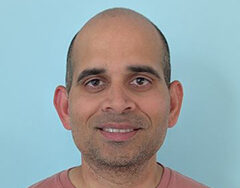Recording Venue: Skype
Guest(s): Dave Thomas
Host(s): Arno
Dave explains why reading source code is at least as important a skill as writing source code. He shares approaches for how to get to grips with unknown and undocumented source code even if it is non-trivial in size. He finishes with advice for how to get started reading code.

SE Radio 148: Software Archaeology with Dave Thomas
Join the discussion
You must be logged in to post a comment.
21 comments
More from this show
Matthew Skelton joins host Giovanni Asproni to talk about team topologies—an approach to organizing teams for fast flow of value. The...
Vinay Tripathi, a senior network engineer in Google Backbone Engineering and an 18-year network engineering veteran, discusses BGP...
Tim McNamara, a well-known Rust educator, author of Rust in Action (Manning), and a recipient of a Rust Foundation Fellowship in 2023...





… since there’s links to the prags, I guess this is PragDave this time (as opposed to OTI Dave). Right?
Thoroughly enjoyed this episode. Thought Dave was a bit hard on comments, but he fully redeemed himself with the statement: “Comments about ‘why’ are helpful” And so are “Comments that direct me to other relevant locations”
Also liked the references from this podcast. Could do with more. The ;;;; collaps is a neat idea.
Thanks again.
PS. Your CAPTCHA may be very safe, but I had 5 gos to get it right. Case sensitive is not easy if you dont have a base because the letters dance. The difference between Y and y is where they are positioned on the line. the shape is almost identical.
Bram van Oosterhout
Yes, this time it is PragDave.
I was really disappointed with the sound quailty of this episode. There was a really annoying knocking noise in the background when Dave was talking. Shame really, as it’s very interesting otherwise.
I very much like the recommendation of reading the source of that which you use (Ruby, Perl, Python etc.). I’d like to add one recommendation, though: Don’t use quirky ways of coding in an interpreted language just because you found out from the source that they work with the current implementation of the interpreter. I may be stating the obvious here as such exploitations of quirks may, in time, turn into some future software archaeologist’s nightmare.
“Beware of evil wizards” — yes!! Personally, I find those who use generated code without understanding it are really the evil ones. In fact, writing a wizard that relieves coders of writing boilerplate code is perhaps misguided (as the root problem that ought to be fixed is the requirement of having all that boilerplate code), but using anything you don’t properly understand is always a step towards a dark age in which superstitions flourish.
I agree there are a few annoying buzzes and clicks and a few echos (presumably from mixing input from two microphones) but it’s perfectly intelligible. I also listen to the BrainSciencePodcast (.com) and some of the early (and even mid) episodes of that have dreadful audio, so this episode really isn’t so bad.
I found it really interesting and will be looking around for code to read. I’d really appreciate some links on repositories of good code, as was discussed in the episode. The book and article are interesting, but more recommendations of code to read would be great.
Thanks and keep up the great work SE Radio.
the way PragDave carried himself. He was totally awesome and at boring at the same time but you’ll definitely say that he knows a lot of things. I was actually doing my paper writing when heard about PragDave.
So while software archeologists try to imagine how a system might work or have worked, we Smalltalk developers have the luxury of just starting the system up and live in there for a day or two. Since this episode was released, there have been a lots of reactions mentioned and
sample essay came out all over the net. Interesting. Absorbing.
[…] This idea lends itself to Dave Thomas thoughts on software archeology. […]
This was a very interesting episode. One of the insights from Dave Thomas is that “code rots”. Over time, assumptions and inputs can change, and the unit tests for code that is unmaintained can often begin to fail.
[…] Oracle’s strategy is to get Java ME, Java for embedded and Java SE to converge, because want to reduce the number of Java virtual machine Hotspot implementation to at least three codebases. With the modularisation piece in Jigsaw, and a modular HotSpot engine they can swap in and out the necessary adaptation for target devices. Seen or heard something like this before? I think some of you already have, if not then go and listen to Software Engineering Radio podcast, I suggest the episodes on Feature Oriented Software Development (Episode 172 and 173 of SE Radio with Sven Apel) and Product Lines (Episdoe 153 Jan Bosch on Product Lines Software Development) and I also think Software Archaeology (Episode 148 Dave Thomas). […]
[…] Software Archaeology with Dave Thomas […]
[…] Software Archaeology with Dave Thomas […]
I truly believe that reading the script is very important to write an effective code. Well, it is not that I am an expert in the field but I feel it is truly sensible. Anyway, after finishing my essay through the help of topessayservices.com, I plan to study html and website creation too.
[…] the interview that gave me the idea for a code club, Dave Thomas recommends manually shrinking code down to 2px […]
[…] And by the way I you want to know how to read source code as a software archaeologist you should listen to this Software Engineering Radio episode with Dave Thomas “@pragdave”. […]
The idea of scrolling a source file in font size 2 is very interesting.
This was an intresting audio share. I learned quite a lot of new things. Thanks to PragDave! http://www.norgesautomaten.cc
this software will help many archaelogy project in future
[…] http://www.se-radio.net/2009/11/episode-148-software-archaeology-with-dave-thomas/ 1 comment | 0 points | by WazanovaNews ■ comment by Jshiike | 約1時間前 他人から引継いだコードを把握するのにどこから着手するかという… […]
Very useful article, I really like it. Please accept our follow-up